#there's something fundamentally wrong with this storytelling
Text
I'm sorry, but from Eddie taking Buck on an unofficial date looking like he's ready to drop to his knees any second if the situation allowed, to meeting, supposedly, the love of his hetero life in a hardware store, a few episodes later, just doesn't compute for me.
I'm going to need to reset my brain. 🧠🤖
#eddie diaz#buddie#evan buckley#911 spoilers#911 6x17#doesn't compute for me#there's something fundamentally wrong with this storytelling#911 speculations#911 on fox#911 fox
107 notes
·
View notes
Text
honestly. being real. ive looked into a lot of various indie ttrpgs that haven't spoken to me, and i end up just coming back to D&D over and over. and i think i finally fully understand why that is.
D&D is very heavy on rules for what can happen in combat, but fairly light on rules for when it comes to story structure and roleplay. as a result, roleplay scenes feel a bit more natural and flowing, with the only mechanical aspect being the occasional skill check for like, intimidation / deception / persuasion / etc. but then, unlike the roleplay, the things that can be achieved in combat are pretty strictly regulated. this is fun for how i like to roleplay, as someone who used to do a lot of freeform RP--the problem with freeform RP style combat sometimes is that if you're RPing combat with someone who gets really wound up about making their characters always win, it can be really fucking hard to counteract the shit they have their characters pull out of their back pocket. having a VERY clearly defined and strict set of rules for specifically combat makes it so that when combat DOES happen, people can't just Say Shit about what they have their characters do--they have a limited character framework to work in and a limited set of tools that they can work with, and enjoyable combats come from using those tools in that framework creatively, effectively, and excitingly. this makes combat feel like it has genuine stakes, and when done right can be very intense and exciting. and then when you do actual like, character interaction and story building? there's just not a lot of strictly defined rules for what can and can't be done in those realms, both for a player and the DM. there aren't any constraints on the structure of the narrative that the DM presents, which means it's fairly easy to rip out the pre-packaged D&D lore, re-fluff a few things that heavily reference that lore, and just homebrew your own story structure and lore and world and characters and pantheons and the like.
my problem with a lot of indie TTRPGs is that a lot of them are married to either a very specific story structure that the system mandates that you follow, or a very specific pre-made world that the system is mechanically built to form around, and that level of pre-determination doesn't interest me either as a player OR as a GM. like these are fundamental rules in these systems that would gut it if you tore them out and replaced them with something else, which means that if you tried to go against those premade structures/settings, you would basically have to homebrew the entire goddamn thing from scratch anyway. D&D's relative rules-heaviness of combat and rules-lightness of roleplay makes it easier for D&D to provide me the kinds of stories that i actually want to participate in, even if people insist it's not as "flexible" as many people think it is. like. yes. don't run a regency romance game in D&D, obviously. but if ur running a high fantasy type of game focused on adventuring, D&D can be adapted pretty well to a homebrew setting and world with minimal effort.
and tbh, i really think that's why it has the cultural dominance that it does, and why i personally keep engaging with it as a ttrpg even as people yell from all sides to play something else. "just do freeform RP!" ive done freeform RP. it's good for character building and dialogue and intrigue and sex but it fucking sucks when characters have to fight. i fucking hate it when im trying to RP fighting in freeform RP and whatever person im fighting against just keeps fucking kicking my ass no matter what i have my character do because my RP partner is so invested in forcing me to lose or give up that they just pull whatever the hell they can think of out of their back pocket to beat my character into submission. at least with an incredibly well-defined set of rules for how combat works, your opponents are also working in a limited framework with limited tools, so even if they do fucking kick your ass, it doesn't feel completely stupid and arbitrary, and since opponents' attacks are governed by dice rolls almost as much as players' attacks are, the amount of arbitrariness in the combat is not wholly stacked against you unless you're fighting against something that's WAY out of your party's league--and even then, those creatures and people are still going to be bound by their dice rolls as much as you are, they might just have better bonuses and/or fewer penalties to make things a bit more favorable for them. that horrifying fucking monster you're fighting may have an insane bonus to attack, but it could still roll a critical fail when it tries to attack you, just as much as you might roll a critical fail to attack it in turn. everyone operates under the same rules and will have similar limitations placed on them by those rules, and participants have much less leeway to make their characters' combat prowess be whatever the hell they want whenever anything even mildly threatening happens.
#sye's babbles#i also think that people who holler about 'forcing D&D to tell unfitting stories' are seriously overestimating how many ppl actually do tha#like. D&D has certain aspects of how it works that are pretty useful building blocks!#i like the idea of the six ability scores and the skill system!#im not super fond of how magic works in D&D though#which is why one of my projects of trying to homebrew my own TTRPG game was like#taking some of D&D's fundamental building blocks and then remaking the magic system how i personally wanted it to work#because there are certain elements of D&D i do LIKE a LOT!#and i dont think there's anything wrong with borrowing some of those elements to build off of when you're making a homebrew system#like i understand the desire to encourage people to play something other than D&D#but some of us have looked into the systems you're recommending and just.... didn't like them!#like a lot of the time the shit people recommend are not what i am looking for in a TTRPG#and a lot of people seem to misunderstand that#the basic idea of Adventuring as presented in D&D is a fun baseline to work with!!!#and while i understand some people might be more interested in trying out other story structures or genres......#i like the genre trappings of D&D and adventuring and doing quests and shit like that.#i really do enjoy it as a genre of storytelling on its own.#i get that some people want to do horror or other shit like that#but please understand that i just want to toss 3-6 gay little dudes me n my friends create into a group#and watch them battle monsters and solve problems and buy magic items and shit.#stop assuming that everyone who plays D&D only does so because they dont know any better#i play D&D because i enjoy it!!! ive been playing TTRPG since i was in middle school and i've enjoyed it this entire time!!!!#if you wanna play other indie RPGs thats totally fine but ive seen other systems and they just dont interest me#and it's NOT because i am inexperienced with TTRPG in general#the first ever TTRPG i played wasn't even IN D&D it was in BESM#my formative TTRPG experience was NOT D&D and i still choose to engage with it because it makes my brain go brrr while other systems do not#[old man voice] get off my fucking porch and let me enjoy my day
2 notes
·
View notes
Text
Me: I don't like when shows queerbait me.
Other Fans: Well then just watch other shows, dummy!!!!
Me: 👍👍👍 wow what a tidy way to dismiss and invalidate a legitimate reaction to homophobic story tropes! 👍👍👍
The "just leave then" response to people wanting more inclusivity from the stories they love is not just emotionally invalidating - it is also one of the things that keeps storytellers from feeling that they need to improve in the future by making fans feel stupid for demanding better representation in the first place.
This kind of response doesn't just make you sound like a conservative (since this is a VERY popular response that conservatives have when confronted with leftist media criticism), it also fundamentally ignores the fact that there may not BE an equivalent story with good rep to go to after leaving the queerbait-y one behind.
Delicious in Dungeon is special and unique; that's why I genuinely love it. It is that love that makes me want it to do better.
When I see that Shuro is allowed to openly express romantic love for Falin, but Marcille/Falin is relegated to mere implication, it makes me really sad. It may not be a romance manga, but there ARE straight couples, and hetero desire IS on display - which makes the lack of open queerness all the more noticeable.
So when people say "just go watch something else" in response to my genuine sadness and irritation that a beloved story is excluding people like me..... Are you telling me there's a nearly identical queer show - with a similarly active fandom - all about found family learning to cook beautiful foods in a dungeon? Is my favorite-guy-ever Senshi going to be there? Is there actually a place for me to go to??
OR is there only one Delicious in Dungeon, and that's what makes it great?
I think actually folks who respond this way just want me to leave, and they don't really care where I go, so long as their favorite thing doesn't have to stand up to criticism.
Because I don't want lesbian media elsewhere. I want it here, with my friend Marcille. Here, where the seeds of queer romance were purposely planted to hook my attention. What's so wrong with being disappointed if those seeds never grow to bear fruit??
We can like good art and still demand it does better. And we can validate people who are sad it isn't doing better without getting defensive. Critical analysis is healthy and important. It's how good and bad stories are fully understood, and it's how better stories get made.
And while I will try to enjoy the plentiful delicious crumbs I am being served (since it is more than most shows give me), just because I CAN squish a bunch of crumbs together into the approximate shape of a muffin, that doesn't mean I've been served a meal.
More on this topic because I love a good analogy
My original post about queerbaiting in Dungeon Meshi (that inspired this one with the replies I got from it)
#original#i love the show i am loving the manga but this is queer baiting plain and simple. i don't want to leave i want better rep.#I know they're not going to give it to me but how about you don't invalidate me when I say that makes me sad and they should do better??#dunmeshi#dungeon meshi#falin x marcille#marcille x falin#marcille donato#falin touden#queerbait#queerbaiting#falin dungeon meshi#dunmeshi falin#marcille dungeon meshi#marcille dunmeshi#delicious in dungeon marcille#delicious in dungeon#listen i adore marcille and I'm angry on her behalf that she is not allowed to truly be the romantic heroine she is set up as#not without layers of obstrusion and vaguery.#i would at this point honestly love to be proven wrong about dungeon meshi being a queer text bc i love i#* because i love the show a lot#but so far I'm p sure this is queerbaiting and folks have been gettin mad about it but their arguments don't make sense to me
128 notes
·
View notes
Text
Cinematography?? In MY BL??? Not as likely as you think.
TLDR: it's a joke!!! but also legit sometimes I see "cinematography in bl" and it's just some basic pictures with mid-tone lighting and blue t-shirts. Let's talk film terms like: aperture, panning, tilting, and movement in film so we can see what goes into cinematography (with sources!). Also if I name a show you like as "boring cinematography" don't send me hate mail I'll laugh
(examples used: Our Skyy2 vs kinnporsche, 2gether vs semantic error, 1000 Stars vs The Sign)
If I name a show you like in this post as "bad cinematography" be chill about it, like, I ain't saying you can't like it, I'm just talking about techniques here not personal likability or overall show quality. I like badly filmed shit too say hello to my collection of Friday the 13th Blue Rays we're just here to talk techniques and like, educational stuff okay?
So the straight (heh) textbook definition of "cinematography" is: the art of making motion pictures. Which, frankly, tells you nothing. Like it's not wrong~~ but it's not informative either. Cinematography covers a lot of what we, the audience, visually see on screen:
"Cinematography is the art of photography and visual storytelling in a motion picture or television show. Cinematography comprises all on-screen visual elements, including lighting, framing, composition, camera motion, camera angles, film selection, lens choices, depth of field, zoom, focus, color, exposure, and filtration." (source)
So let's talk movement in film.
So when I talk about movement, what do I mean? I mean the way the camera, the characters, and the environment moves within a frame.
This video on Akira Kurosawa's usage of movement in a scene is brilliant:
youtube
Something as simple as having rain or fire in the background of a shot can enhance the emotions of a scene vastly. it gives the scene depth - literal depth, not narrative depth - that would otherwise be missing.
The way the camera moves and transitions leading the viewers eye back and forth makes what you're watching more engaging. You aren't consuming these scenes, you are engaging with them. They are apart of the story itself, giving the environment life and texture so the characters within them matter more.
And, look, I get busting out Thee Akira Kurosawa might be unfair, but if we're gonna talk cinematography we can't not talk the importance of movement on film.
To understand good cinematography you have to understand what makes it good and as such what makes bad or mediocre cinematography.
In connection with movement we gotta talk about camera techniques like panning and tilting:
youtube
"Camera movements are a fundamental part of video production. They can be a powerful storytelling device, heightening tension, evoking emotions, and bringing the viewer into the action. Without saying a word, camera movements can transform a scene’s entire narrative, and direct audiences’ attention where you want it." (source)
So we have movement of environment, of characters, and we also have movement of the camera itself.
Ok so like, where does the BL come in Pikachu??
I'm getting to that, I'm going to start with a more general example: Our Skyy 2 (Bad Buddy meets 1000 Stars edition) vs Kinnporsche.
youtube
Starting at 5:17 we have Pran stranded or whatever, and this shot is like, it's fine. It's boring as hell, but fine. Why is it boring as hell? Well it's flat, it lacks movement, it lacks depth.
When the driver drove off the camera could have panned to follow his movement and then panned back to Pran at a different angle to showcase his isolation. Honestly since the scene starts with a mid close up of Pran, I would have had the camera behind Pran as the driver drove away, and had the camera pan around Pran 360 so we get shots of his environment, and him, while also emphasizing holy shit he's like, fucking stuck in the wilderness.
In general, there's a big lack of movement in the scene. The camera remains almost entirely static, there's no attempt at zooming in or out, following Pran's movement, or showcasing his environment in any meaningful way. Even when Pran begins walking towards the camera the angle of the framing is still centered, rather than tilted downward or upwards to give us more dimension (non-BL comparison, the Book of Eli starring Denzel Washington does the "walking towards the camera" shots really well).
We get a cut of a medium close up of Pran, with a deeper focus so his environment is blurred out.
I understand the thought process of this shot, we want the audience to focus on Pran, but if the point of the scene is to emphasize he's alone, confused, maybe even a bit anxious at his new circumstances it could've been done better. Take a wider shot from this angle, open up the lens to allow for that background environment to come through and show him isolated. Maybe do a pan above him or tilt the camera up going from his feet up as he nervously ruffles his hair. There's options here.
This just adds more walking to the scene, which we already had. It doesn't enhance or emphasize anything about Pran's emotions as a character.
Anyway the camera continues to follow him and then we get another cut. And it's from the same angle as before, only this time we see a truck coming. The camera remains static, it completely stops moving, and we just wait for the truck to drive into the frame.
This whole sequence of events ends at 5:57 and while not a long sequence I find it frustrating because it's boring. The only way the audience knows that Pran is anxious is via Nanon’s acting, there’s nothing in the filmmaking that enhances or contributes to that feeling.
He’s alone, until he’s not, and that’s all the scene tells us. It leaves the scene lacking any tension as well, because we’re not getting a sense of isolation - how large is this space? How alone is Pran right now? What is the entirety of the environment?
Contrast this with a similar scene in kinnporsche ep06 where Kinn and Porsche are alone in the mountains. I don't have a video of this specific scene so I have to link the trailer, starting at 1:48 to 1:52, but see how we start mid-close up of Kinn and Porsche, then pan out from above them? This is a better showcasing of just how vast the environment around Kinn and Porsche are.
They're still center frame throughout all of this, the depth of the scene is in mid-focus so nothing is blurred out and you can see the sharpness of the environment.
It also places the audience in the same space as Kinn, who is looking up at the sky while the audience looks down at him. It makes the audience a more active participant in the shot, emphasizes the state of the characters, gives the audience a sense of space & environment, and relies a sense of emotion.
The additional fast zoom out also adds to the scene by adding movement and making it more dynamic.
youtube
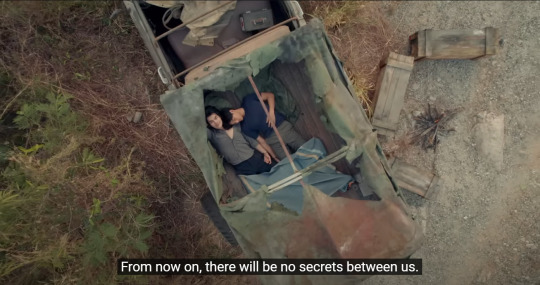
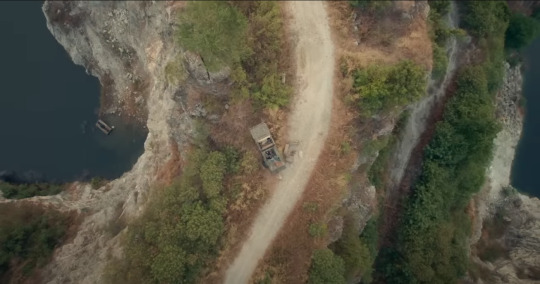
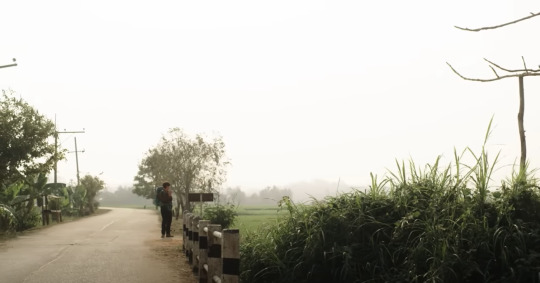
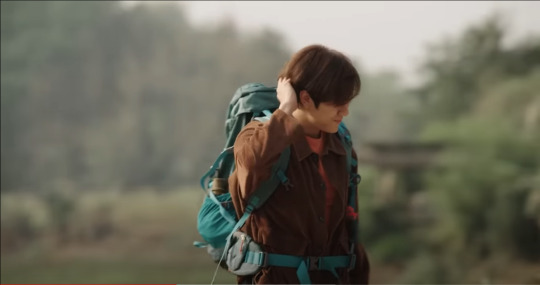
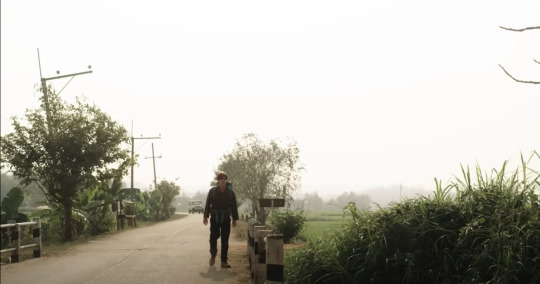
(my man pran looking like this 🧍)
Both these scenes are pretty short, but they're relaying similar information and one is way more dynamic and effective than the other. Both Pran and Kinn/Porsche are alone in the wildness, but in the latter there's a lack of space, a lack of movement, and a lack dimension. This is mainly a framing issue, so let's talk more about camera movement (panning, & tilting).
Here's a scene from 2gether vs a scene from Semantic Error.
youtube
(saw someone say 2gether had a high production value and chepie where??)
This entire scene with Sarawat and Tine is flatly shot. There is nothing in their background so no outward movement is happening, the lighting is even as are the colors, everything is at the same depth, and there's little to no motion in the camera.
The scene with Sarawat pushing Tine into frame. Why doesn't the camera follow Tine's motion of movement so the scene has more momentum? It just stops and the char falls out of frame before walking back into it. Then we get a series of cuts back and forth of close ups on Sarawat and Tine's faces. Back and forth, back and forth.
The editing leaves a ton to be deserved because if the back and forth did a quick pan back and forth with each beat we could build up tension, give the scene some texture, heighten the intensity of the argument. If we're going for something softer we could place them in on better set, or make the characters move themselves - have Sarawat walk away from the argument up those stairs, have the camera follow his movement as Tine chases him continuing the argument - or play with the lighting a bit, pan the camera down or tilt it something!
When Tine kisses Sarawat why doesn't the camera move with him in a more notable way? Why did we have a cut to a close up? And then we're back in a mid close up and more cuts and this editor is killing me!
This scene is 4mins long and the only engaging bit of filmmaking here is when the camera follows Tine when he steps closer to Sarawat putting the latter in the frame at 3:15, the entire scene is 4 minutes long.
I want to compare this scene to this scene in Semantic Error which is also all dialogue and also obviously filmed on a shoestring budget.
youtube
So right away the camera work here is smart, it starts off in an establishing shot, evenly lit, of Sang Woo and Jae Young both in the frame. Then we get a mid close up of JY looking down, then a tight close up of JY looking up.
The change in camera angle emphasizes his surprise at seeing SW here as he looks up at SW. The lighting has also changed, it's much brighter now. The camera also begins to move, where it was static before it begins to tilt and shift.
We get a cut to SW, the first one of this scene. JY is seeing SW in a new light for the first time, and as such so is the audience. By starting the scene off in an outward shot with both chars in the frame, they are placed on the same level and the audience doesn't see their expressions up close. So when we're hit with JY's close up of surprise and then SW's close up of his wet hair it holds way more impact. It enhances the feelings of JY's character for the audience.
The lighting behind SW has also changed, it's much brighter, and warmer compared to the cooler tones of light behind JY. The camera also slows, and continues to to tilt and shift. JY's world has literally been shifted on his axis.
We get another cut, this time medium on SW and notice, the camera stops moving for that moment and the light around him dims. It's not as saturated. We're moved out of JY's pov here and back into "regular" framing.
SW tries to make JY leave, we get a close up cut of the cut on JY's arm - hey editing used to display important and new information! - then the camera cuts to SW getting medicine and here's a small but important thing, when he tosses at JY the camera follows his movement. And instead of cutting away, when JY gets up thinking SW is hurt, the camera follows JY's movement back towards SW.
It would have been easy to make a cut there back and forth - like in the 2gether scene did over and over - but following the movement of the characters makes the scene way more interesting visually to watch.
Changing the angles of the camera from a lower angle (where JY is looking up) to a downward angle (where SW is looking down) makes the scene more interesting visually as well and enhances the storybeat of JY looking up at SW in a new light memorized. This contributes to the story as well, as it's JY who catches feelings for SW first so their are literally, on uneven ground until they're not later in the story. The camera is panning, tilting, moving with the characters even given the limited space. The lighting adds to the effectiveness, as do the minimal cuts.
On a technical level, the scene in Semantic Error is just better filmed. In my own opinion, the scene is far more engaging b/c the filmmaking is better, where in 2gether the reliance is almost completely on the actors to sell the scene with little help. And I'm not saying nothing about Bright and Win cause their stans wildin'.
Next, I wanna talk about aperture.
I saw a post that used this word and I didn't understand the context in which they were using it because aperture isn't a style of filmmaking its a camera setting or lens adjustment - it's the rate at which the camera opens and closes letting in light and focus.
"Aperture is the opening of the lens through which light passes. When you hit the shutter release button to take the picture, the camera aperture opens to the predetermined width, letting a specific amount of light through. A large aperture lets more light in, and vice versa. Aperture is calibrated in f/stops, written in numbers like 1.4, 2, 2.8, 4, 5.6, 8, 11 and 16. The larger the number, the narrower the aperture." (source) <- really recommend this article if you want to learn about aperture in film.
A great non-BL example of aperture used for style is One Piece Live Action where cinematographers Nicole Hirsch Whitaker, and Michael Wood love using deep focus aperture in a lot of scenes.
But let's compare The Sign vs 1000 Stars.
youtube
youtube
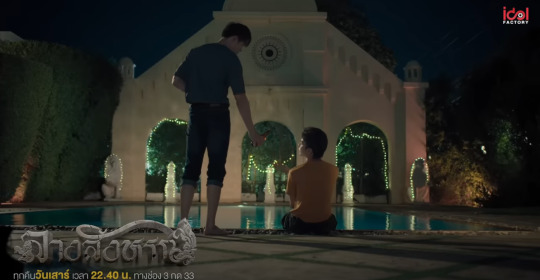

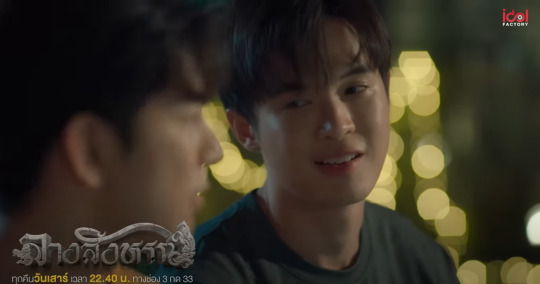
So when the scene starts, we're in mid-focus/aperture, everything is of similar sharpness and depth. Nothing is especially blurred out we're getting the full spectrum of Phaya and Tharn's environment.
When the camera switches to close ups of Phaya and Tharn however, we get a deep focus aperture. That's why everything behind them is so blurred out. In a close up of Phaya, even Tharn's face is blurred. The director wants the audience to focus specifically on these characters individually, so we can understand the weight of their dialogue. But when the camera wants us to see the characters as a unit, it cuts, pulls back out of that deep focus and everything is back in mid-focus again.
Here's another thing, it's subtle but it's important.
This scene also combines what we already discussed about movement. At :08 of the scene, in that first mid-shot the camera is actually zooming in closer on Phaya and Tharn. Not dramatically, subtly, but it is there. This is important, because at 3:23 we get another mid-shot of them, pulled out of that deep focus, and the camera begins to zoom out.
The camera also follows the movement of Phaya grabbing Tharn's hands, then pans back up to Phaya's face once again before panning higher into the frame and panning back to their faces and zooming in.
When we move back out of that deep focus, into a mid-shot the camera continues to zoom out on the two characters as they kiss.
I saw someone say that this scene wasn't "filmed like BL kisses" and, eh? Like it isn't filmed in that static style of filmmaking which has dominated BL filmmaking probably due to budgetary reasons. But
The Sign follows a similar filmmaking style as Kinnporsche and Domundi shows do. But also just like, basic filmmaking techniques you'd see in shows of the non-CW/soap variety.
The thing fans are seeing here is film technique (probably partially due to a larger budget). Movement, lens adjustment, panning and titling, lighting and color are all playing a role in this specific scene.
Cinematography baby.
(sidenote the VFX of The Sign is dope as fuck too)
Okay so let's talk Our Skyy 1000 Stars
youtube
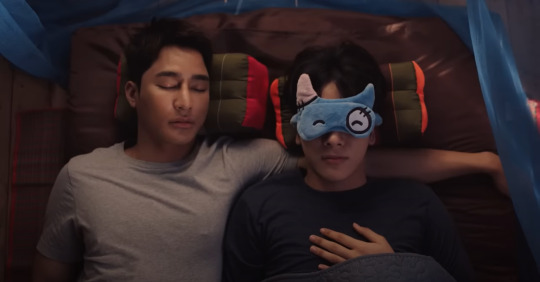
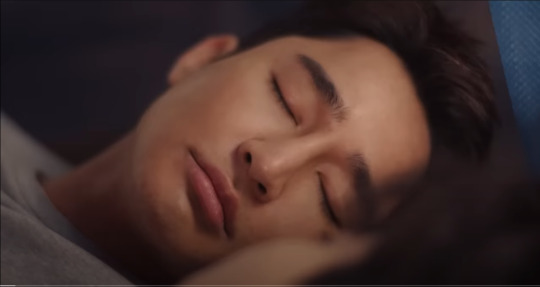
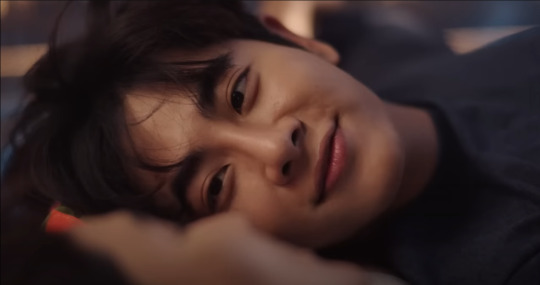
So this opening scene follows a similar structure to the scene in The Sign: mid focus shot of the two chars, into separate deep focus close ups. It's also a dialogue heavy scene like the one with Phaya and Tharn.
So why does their scene work better on a technical level than this one in Our Skyy 2?
The scene in The Sign combines techniques of aperture, movement, lighting, color and framing to give everything more impact.
In this scene with Phupha and Tian we get a similar editing style as the scene in 2gether: lots of back and forth cuts, very tight close ups, static camera movement. Where as the camera zooms in and out during mid-shots, the camera doesn't move in Our Skyy 2. It remains motionless even though a zoom in as the two characters lay in bed would add a lot to the scene itself.
In the close ups the camera continues to remain static, only changing angles when there's a cut. At 1:22 Phupha moves his arm to wrap around Tian, the camera could have taken a closer shot at his arm, and then followed his movement as he wraps it around Tian. Like how the camera followed Phaya's movement when he holds Tharn's hand.
Instead it's just a flat shot, we see his arm wrap around in a mid-focus above shot. The camera does move to follow Tian a couple times - at 1:50 for example. But overall, the scene is stiff - who sleeps like this frfr - in framing, in movement, in depth.
I want to say that I don't think this scene is bad - like I do the 2gether scene or the earlier scene with Pran - I think it's just, okay~~
And no, for none of these examples did I pick "the worst" shots or whatever. I'm not out to get any specific show, but tried to find comparable scenes and compare and contrast the filmmaking techniques used in both and how effectively they were used.
I want to leave off with this.
There's a lot that goes into cinematography, yes this singular shot of Furiosa is amazing, but what makes the scene amazing?

youtube
Pay attention to how the camera moves (panning and tilting), when the camera moves (zooms in and out), the movement of the scene (the hair and sand moving), the lighting (Furiosa from behind is in darkness, her side profile more lit), the depth of the scene itself changing (as she walks away from the group the focus/aperture gets deeper on her, then when she walks out of the frame it grows larger to focus on the characters left behind).
All these little things make up what is "cinematography". The more you learn about the techniques used the more you can notice about film and what makes a scene powerful.
As BL gets more budget we're seeing shows expand their filmmaking catalogue more and more. Which is exciting! If fandom is gonna talk cinematography I think it's helpful to have the vocab to do so, and it's cool to watch a scene and be like "oh I see what they're doing here and why and how".
I mentioned other things that go into cinematography like framing, lighting, color, and there's also editing (which is separate). Idk if I'll make a post about those things cause I'm lazy and this shit takes forever to research and write but who knows~~
Check out other posts in the series:
Film Making? In My BL? - The Sign ep01 Edition | Aspect Ratio in Love for Love's Sake | Cinematography in My BL - Our Skyy2 vs kinnporsche, 2gether vs semantic error, 1000 Stars vs The Sign | How The Sign Uses CGI | Is BL Being Overly Influenced by Modern Western Romance Tropes?
[like these posts? drop me a couple pennies on ko-fi]
#the sign#the sign the series#kinnporsche#gmmtv series#gmmtv#chaos pikachu speaks#chaos pikachu metas#fuckign a i should open a ko-fi this shit takes forever to write#pikachu's bl film series
164 notes
·
View notes
Text
So, apparently it is now confirmed that Chloé will appear and play a role in season 6 & 7 of ML and let me just say: I wish she wouldn't.
I absolutely love reading and writing Chloé redemption stories. For me, she is the most fascinating character of the whole show.
But all that love and fascination is based on the first 3 seasons. I have zero interest in the narrative punching bag she had become afterwards. At this point, even if she would get her redemption arc, it would still feel completely unsatisfying to me.
There is also just something unsettling about how Thomas Astruc argues Chloé was too privileged for a realistic redemption. It makes me believe the man will only be satisfied when the girl gets further punished and loses everything - not that there is much left - and only then is she allowed to have a happy life.
I have no interest in playing armchair psychiatrist, or analyzing Astruc's real life views on punishment, but even from a Storytelling perspective I just don't understand this view. Zuko's redemption in AtlA, as an example, works so well because Zuko chooses the 'right' path after he got everything he wanted. He became crown prince, got his father's approval and even 'got the girl' and still he abandoned it all because he felt what the fire nation did was fundamentally wrong. That makes for a satisfying character arc.
I don't know if there are any actual plans for a Chloé redemption in canon, or if the show will just continue to evillize her more and more. At this point, I don't think it actually matters. I just wish they would finally leave the character be, so I can enjoy my fanfiction without having to read on social media about the newest absurd plot for a fictional 14-year-old girl who has long ago lost all purpose for the plot.
84 notes
·
View notes
Text
I saw a popular author post about how, while of course Elizabeth has some obligatory flaws, Darcy's are exponentially more severe, and it was like stepping into a view so far removed from mine that it was almost disorienting.
The thing is, I periodically see people wondering why Elizabeth/Darcy is such a behemoth in Austen fandom when either/both of them have substantial flaws that the narrative doesn't shy away from. Their flaws aren't identical, but they do obviously mirror each other and are thematically intertwined, with reflecting character arcs and specific beats. As I see it, the novel maintains a tense and careful balance between them—not in terms of centrality (Elizabeth's mistakes and growth are more central to the narrative than Darcy's IMO) but in terms of the weight given their flaws and virtues.
And for me that's essential to their appeal!
I love plenty of other Austen characters and relationships, but for me, personally, none of the other canon pairings are balanced in such a fun and satisfying way. The closest (and the other most conventionally romantic pairing in Austen IMO) is probably Anne/Wentworth, where at least the choices of both of them are heavy contributors to their current problems. But a) the novel is ambivalent as to whether Anne actually erred morally in the first place and b) that is long in the past by the time of the novel; the Anne of the main story of Persuasion is a fairly idealized figure by contrast to Wentworth.
I sometimes see arguments that, say, Anne or Mr Knightley or Elinor Dashwood or whomever are actually as flawed and prone to error as their romantic counterparts, but I just ... don't buy it, honestly. As far as canon Austen goes, I only really see that balance in the course of the main story with Elizabeth/Darcy. P&P loves them and holds them up as admirable (and they are!), but it also loves undercutting them in clearly paralleling ways and does it over and over throughout the novel.
So the idea of an Elizabeth and Darcy where one of them has obligatory storytelling flaws that can't seriously be compared to the other's is just ... blah. It cuts out the fundamental interconnection and resonance between them that I think is built into the structure of the novel down to its bones and is what makes their relationship special. A lot of stories pay lip-service to that kind of dynamic, sure, but despite the many (many) imitators, I don't often see it done successfully. But P&P is the real deal.
So yeah, when people are like "why do people like Elizabeth with Darcy so much when she could have a different man who doesn't make serious mistakes" I'm just thinking ... why on earth would I want Elizabeth "there was truth in his looks" Bennet with someone who would never make mistakes on that level? Or when people are like, Darcy's just misunderstood, wouldn't he be better off with Jane [or another relatively idealized female character] it's like ... hell no, I love him, but I do not want to inflict him on that poor woman.
It's not that there's something wrong with multishipping them (I've written alternate pairings for both!) or shipping them with other people, but just in terms of the novel as it exists, I do think the balance and echoes between them are part of what makes the novel work and one of the sources of their long-standing popularity. And I feel that trying to pin the "real" blame on one or the other up-ends that balance and diminishes a lot of what I, at least, find appealing about the dynamic between them.
#anghraine babbles#anghraine rants#austen blogging#austen fanwank#otp of otps#elizabeth bennet#fitzwilliam darcy#long post
140 notes
·
View notes
Text
Okay now that Anissa is in the show, I have to talk about THAT storyline. There's not much particularly new I can say that hasn't already been discussed but I need to gather my thoughts on what the show has to do to be successful in this regard. With that being said,
Spoilers for things the show has not covered yet
And massive Trigger Warning for discussions of sexual assault and post-assault trauma.
So first things out of the way, I do not believe they should cut it. The changes the show has made are ultimately pretty minor. A character change, order of events swapped. With them sticking as close as they are to the comic, I think it would be a massive problem to skip over it from a story telling standpoint.
From a real world standpoint, it's even more important. Male sexual assault is something that rarely gets depicted properly. It's usually a joke or a moment of triumph and that very much has had an effect on the way we look at it in the real world. And since Invincible is now a show pretty much everybody has their eyes on, choosing not to talk about it would be missing an opportunity to have a very real, very important conversation that very well could educate men on how to navigate and survive what they are going through.
I'm also worried that they'll be too afraid to actually say the word "rape". Lots of modern adaptations delete important discussions like Sokka's sexism or the gender discussions from Cowboy Bebop in order to avoid properly handling them and usually replace them with something worse in a sort of "all bark and no bite" liberalism. Directly saying it as it is is incredibly important to showing that talking about it is not only NOT shameful, but also necessary in getting the help you need and the healing that is necessary to survive.
And from a storytelling standpoint, saying it is important too. The moment where Mark tells Eve what happened is not only great in showing that telling someone is important but is also the moment where Mark is forced to admit the truth to himself. "She raped me." Those three words are a massive turning point for the whole story. Character dynamics change, this becomes a focus for most of Mark's loved ones, and it fundamentally changes his life.
Markus. This is a piece of the puzzle I don't see many talk about. While the rest is a showcase of what to do, Markus as a character is a showcase of what not to. It is so, so rare that a child conceived of a rape is properly depicted, nevermind discussed. From Mark's POV, he holds no ill will towards his son. He simply wants him to live a life on Earth with his family like he did and just can't be with him because he is needed in space. But to Markus, his dad hates him. He thinks his father keeps him on Earth so that he doesn't have to think about him. And this idea of his father's disgust contorts his image of himself. He begins to feel self-hatred, hatred towards his mother for making him this way, and hatred towards his father for abandoning him and leaving him to despise what he sees in the mirror. "You made Terra with love. I was made with hate."
Whether Mark meant it or not, his neglect of Markus ruined his early life. No matter how many friends he made, what groups he joined, they could never fill that hole. He idolized his father. I mean, how could he not? His father was, IS a great hero. A man who was out at that very moment leading the movement for universal peace. But because Mark barely visited him, he only had an idea of what his father was like. A man who sacrificed so much to help the world, who fought in space and yet still managed to save the Earth dozens of times. A man who had the time to help everyone and yet couldn't make time for him.
(Important edit: in no way do I mean to say Mark is obligated to be a part of his son's life, I meant that Mark chooses to be there but ultimately fails to do so and that causes issues)
And don't get me wrong, this story has some pretty glaring flaws. For example I think they tried a little too hard to teach Mark that the person who hurt him is human too and has positively affected the lives of many. Like absolutely there is a conversation to be had there but because they had to move on with the plot they kinda just went "HEY MARK DON'T BE SAD SHE'S COOL NOW AND ALSO SHE'S DEAD SO THERE'S NO POINT IN LINGERING OKAY BYYEEEEE". But I think instead of these flaws scaring the show away they should invite the show forward. It's an opportunity to improve on the story and discussions rather than shy away from it.
Oh and also harking back to my previous point in paragraph 2, there's another aspect that makes it stand out in an important discussion. If I'm remembering correctly, the comic makes it pretty clear that Mark could have overpowered Anissa but didn't for a couple of reasons, namely not wanting to hurt her. And that is SO important and SO rare. A discussion surrounding an assault victim who could have fought back but didn't where the victim is NOT portrayed as in the wrong and in fact just as worthy to be traumatized as any other victim is SO DAMN IMPORTANT and could legit change a lot in the way we look at these topics.
So yeah, I think the series should adapt it. Also I think it would be great if they brought on actual victims and experts and whatnot so their depiction could be just that much more focused around what needs to be said. Sorry if all this read as klunky, I have a lot of thoughts bouncing around up here that I kinda just spewed onto the page with no particular order. I'm also obviously not the most educated on the topic. My personal experiences with this were relatively minor and not something I've ever felt comfortable addressing. And yeah I know it's important no matter how "small" or "minor" it seems and I'm not trying to downplay any of that but I just don't really have the words to phrase that differently. Which is exactly why I think we NEED education and discussions about this stuff so that we DO know the words to navigate the topic.
#tw sex assault#tw sa#tw trauma#invincible series#invincible spoilers#invincible comic#invincible#mark grayson#anissa invincible#tw r4p3#tw rap3#why are the tags censored like that that only makes it harder to discuss and to figure out what tags people have blocked#if we have like 87 different versions of the tag then the people who need the warning can't block all of them and thus can't avoid the post#what are we doing tumblr
95 notes
·
View notes
Text
“Who cracks the most jokes in the relationship?”
Xena. You wouldn’t think so given her broody and stoic personality and her dark past constantly haunting her but Gabrielle just brings it out in her. Her silly side is her happy side and it’s honestly adorable to watch her be like this. What’s great about it is it happens really early. It’s almost like having a companion that loves her and that she loves back makes Xena a completely different person from the person she is when alone. Probably because she has more to do than think about how much pain and damage she’s caused to so many. The guilt and shame can’t eat away at her when there’s always someone with her to see the best in her and to keep her away from the suicidal mentality. And Gabrielle didn’t know it for a long time, but that’s exactly what she did for Xena the moment they met. Pulled her away from self-hatred and suicidal ideation and not a lot of people talk about how important Gabrielle is to Xena in this way. When Xena calls her her “source” and “light” - she means her happiness.
So Xena is only the Xena we know and love because Gabrielle is there with her as her cornerstone to living. So seeing her crack jokes at Gabrielle is honestly one of the most significant things about their dynamic and why the comedy episodes are deep and substantial episodes even if they don’t seem like it on the surface because they’re not really about anything. But that’s the point. They’re not about anything… except them. They become the plot. They become the narrative. Their relationship immediately becomes the point. And shows with WLW representation in today don’t do that not just because the WLW characters are rarely the leading characters. But also because they don’t realize that wrapping the characterization around the narrative is the wrong way of representing the relationship between the WLW characters. You always wrap the narrative around the WLW characterization. You make the characterization the focus of the story that is being told instead of the other way around. Xena absolutely excels in this to the point where what you pick up on when you watch the show is timeless because they always leave it open to interpretation.
It is so very important that you see Xena crack jokes, smile, laugh, have fun and just be ridiculous and I swear to fucking god if it wasn’t for Lucy playing her, improvising her lines and just being a total dork… and Renee just bouncing off Lucy’s energy so naturally…
Xena would not be XENA. She’d be lost and lonely. It’d be a different dynamic. It would be a different show. And it wouldn’t have captured my heart anywhere near as much as it has since I was only 5 years old. No, seeing Xena be silly, stupid and soft is EVERYTHING. This characterization is crucial to the storytelling of it. It’s fundamental to what ‘Xena: Warrior Princess’ is. Which is a shows-long story about redemptive love and the power that love can have on a tortured soul. A soul that cannot heal itself and be at rest without its significant other salving and endeavouring to calm it. And please take note that I’m not just talking about Xena in saying this. I’m talking about Gabrielle too and how the roles shift depending on the developments. Depending on where the individual characters are at and that constant rotation of that as if they’re in an eternal dance and how much more romantic that is compared to your average TV show WLW relationship.
Something so seemingly small as a cracked joke at each other even now and again has a very big impact on who these characters are and what they become. When you look at every little detail in the characters as I do and how it all connects to the bigger picture of what the show is attempting to represent to the watcher - it is profound what you can learn and continue to be taught from it no matter how many times you watch it. It’s an incredible timeless show.
I really didn’t intend to write all this in answering this question but I’m an automatic-writer so… yeah. 👌

#xena warrior princess#xena and gabrielle#xabrielle#xena#lucy lawless#gabrielle#renee o'connor#xena cracks the most jokes#wlw representation
51 notes
·
View notes
Text
As someone who fell hard for Xiangli Yao, I have to say -- words cannot articulate how let down I was by the Moonchase Act IV story, oh my gods. Spoilers below:
In the span of twenty minutes, I went from thinking "maybe wuwa can actually write a story" to so immensely frustrated. I read Xiangli Yao's character stories and I thought this was going to be something about how it isn't worth it to burn yourself away for the sake of pursuing more knowledge but NO they just turned it into some type of fairy tale everyone gets what they wanted in the end story. I thought Pascal was being built up to be a contrast to Xiangli Yao with the whole "I should give up everything for research" belief, while XLY believes in pacing himself and not burning up just to reach higher heights.
It's so immensely frustrating that wuwa's writers got halfway there, and then completely dropped the ball. First off, Abby fully killed the mood in the "circle of doors" room (but that's more of a personal gripe, and not really all that significant). Then, the whole "corruption" in the second half of the sonoro sphere journey was just so underexplained and badly done. I think the story had so much potential, with Pascal and the other researchers finally burning out when their research results yielded nothing. And then...there was nothing more that the quest had to say after that -- at least, nothing that wasn't incredibly muddled. Everyone's looking to Xiangli Yao to save them -- but why? We, as the readers, have zero context beyond "Xiangli Yao is a genius," and I think this scene in particular could have been done better if there was more of a clear invitation from the other researchers to Xiangli Yao -- an invitation to burn himself up in pursuit of research along with them. Yes, subtlety is good, but not in this case.
I'm also really conflicted about whether they should've written Pascal's work as so successful. I think it works, but the way they did it was completely wrong, because it actually teaches the opposite lesson: that we *should* burn ourselves out, because our work will have a legacy beyond us. I think that's a fine lesson to tell, but given that it goes against everything the writers were building up up to this point, it feels a little odd. They probably should've picked one side, instead of trying to do nuance in such a ham-handed way. Also, the lack of build-up to Pascal's big old confessional really felt like lazy storytelling. We went from "it's right to do anything to discover the knowledge I need" to "I was completely wrong and I should've backed off". And yes, I know, time and boss fights and all, but it was jarring to me, at least.
Also, can we fucking talk about Xiangli Yao *defending* Pascal's ideals during the boss fight? I'm actually going to throw hands, because it seems SO out-of-character for Xiangli Yao not to be concerned about Pascal's behavior at ANY POINT in that quest, and while I do think Xiangli Yao would defend Pascal's memory, I think he also wouldn't look up to Pascal as a role model of any sorts, given that they clearly had that fundamental rift in ideals.
Overall, super pissed about that quest because I can personally relate a lot to Xiangli Yao's conflicts (at least in his character stories), and I thought I was going to get a wonderful story where those conflicts were explored. I loved the lighthearted dating sim-esque parts of the moonchase quest, but I was seriously excited when I figured we were finally going to get an insight into XLY's character. Sadly, it was a bit of a letdown. Hoping that this isn't the last we see of Yao, though, because his character stories contain some JUICY facts about the worldbuiling of wuwa as a whole.
33 notes
·
View notes
Photo
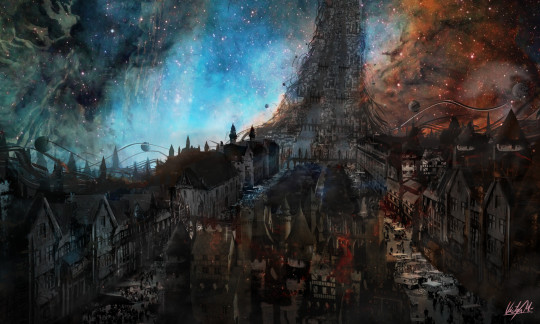
Why I don’t Use the Great Wheel Cosmology
For those of you who might not know, “The Great Wheel” is a name given to the arrangement and relations of planes that’s provided for the “default” d&d setting, and is assumed to be going on in the background of 99% of all published d&d material. It arranges the planes in a looping sequence vaguely based off the alignment chart, with wordily embodiments of the most extreme forces of good, evil, law, and chaos existing at the cardinal points. Souls depart from the material plane and are drawn directly to whatever plane most aligned with their alignment, to either live on in an eternal state or to become outsiders of their particular domain.
Over the years that I’ve run this blog I’ve stated time and again my distaste for the great wheel cosmology, meting out my critiques in bits and pieces as they were relevant to whatever I happened to be writing about at the time. This has happened so much that I wanted to collect all my gripes in one place so I could link back on it instead of reexplaining myself each time. So without further ado, brace yourself for an opinionated nerd telling you his in depth opinions about something that absolutely does not matter:
The whole point of a cosmology is to describe the natural order/structure of the universe, and the great wheel describes a universe that’s effectively just the christian dichotomy of heaven and hell with a few extra steps. It’s a fundamentally moral view of how the multiverse works, and makes “right” and “wrong” not only into objective facts, but a geography you can walk across, travelling from the most morally correct place to the most incorrect place with just a couple of protals.
This system is painfully rigid, not only removing any nuance over whether a course of action is correct, but preventing any competing worldviews from even existing: you can’t have differing belief systems/schisms of faith when you can go out and see proof of the rightness of the great wheel. Much like with how d&d handles gods, this paradoxically removes the idea of “faith” from matters of worship, which to me removes the whole point of having gods in the first place, reducing the big questions around death into a moral assembly line with one of a select number of pre-determined outputs.
It’s no stretch to say that the great wheel is just the alignment chart canonized as a fundamental part of the game world, and while we’ve all grown past the fundimentally black and white morality of the alignment chat It still mystifies me that d&d uses the great wheel as a piece of worldbuilding upon which most campaigns are supposed to be set.
This boggles my mind because d&d has a much better and simplier cosmology upon which campaigns can be set, one that makes no moral judgments and instead allows for the infinite creativity that the game is supposed to be all about. The astral sea is an infinite expanse of possibility, where worlds are spun together from thoughts and dreams paralleling the process of creation that goes into the act of storytelling itself. What better way to explain a multiverse that functions on narrative tropes more than it does physics? Where hope really can prevail against wickedness and rule of cool supersedes the dictates of fate.
To end with a couple of personal gripes, the great wheel is really kind of boring? As a selection of afterlives about half of them are idyllic natural landscapes with nothing really going on and the other half are unplesant caves/wastelands suffering some kind of fucked up weather event. Most of it is painfully eurocentric when it comes to visions of the afterlife, and those planes that DO stand out ( The crashing metal cubes of Acheron) are more weird for the sake of weird.
I can’t help but focus in on how much the great wheel doubles down on the game’s weird hodgepodge of colonialist belief structures. While WOTC has hastily amended out “always chaotic evil” over the past couple years, they still set their material in a cosmology where creatures like orcs/goblins/gnolls are born evil, drawn to evil all their life, and are doomed to suffer eternally in various hells because “evil” is in their very nature. This isn’t good worldbuilding, it’s the authors seeking some kind of weird vindication for their own beliefs by creating a group of people they can feel morally justified in punishing, and we all know where that gets us.
#planescape#the great wheel#dnd#dungeons and dragons#d&d#5e#pathfinder#dm advice#dm tip#dm tips#dm tools#writing advice
642 notes
·
View notes
Text
Why Tears of the Kingdom's Story Doesn't Work
While I will defend the lack of nuance in the text of Tears of the Kingdom, what I will criticize is how the story was executed. TL;DR: The writers tried to tell a story like Skyward Sword, but were limited by Breath of the Wild's nonlinear gameplay formula. Read on below the cut. Spoilers, obviously.
Let's start with Skyward Sword's story and how it was executed so well. There are three arcs: Find Zelda, find the sacred flames to purify the Goddess Sword, and seek out the dragons to find the Triforce. The first arc is notable here, because it's a suspenseful mystery. Link is constantly a step behind Zelda. He's chasing after her with no goal other than to just reunite with her.
The story is able to move from arc to arc and tell a story that evolves over the course of the game because of how rigidly structured the progression is. You will go from point A to point B, whether you want to or not. That way, the writers could drop the right story beats at the right time. It's traditional storytelling, because no other medium has the same level of interactivity as a video game, and it works. Regardless of how it feels to play, you can't deny that the story was executed very, very well.
Breath of the Wild, by contrast, is nonlinear to a fault. You can go anywhere, anytime. The writers were cognizant of this, so they wrote a one-arc story that was compartmentalized into four entirely separate plot lines. Link has one goal that never changes across the game: free the divine beasts to defeat Calamity Ganon. You go to one region, free that divine beast, then go to another at your pace and discretion.
Nothing carries over between plot lines. Nothing you did for the Rito has any impact on what is happening to the Gorons, because every plot line had be to designed so it could the first or last one you tackle. This approach deprived the story of depth or any sense of momentum. They aimed to make up for this with the memories: cutscenes that tell a linear story with more depth, but can be discovered in any order then rewatched in the proper order for the "complete" picture. Critically, though, the memories only provide context to the current events. Knowing what happened in the past has no bearing on the present.
Now we come to Tears of the Kingdom. They went the same gameplay approach as BotW: complete non-linearity. But they tried to tell a mystery story. This fundamentally fails because, like BotW, nothing carries over between the regional plot lines, and they should be impacted by the dragon tears (TotK's memories) but aren't. There are so many ways this falls apart. I'll talk about it through the order I played the game in: Zora, Rito, Gerudo, Goron.
Once Link returns to the Surface, witnesses Zelda appear and disappear at Hyrule Castle, and tells Purah what happened, she instructs him to investigate the odd regional phenomena. So he goes to Zora's Domain and starts working with Sidon. Zelda appears to them, and at this point, Link--and the player--has no idea what's going on. After that, Link goes to Rito Village, finds Tulin near the huge blizzard, and they see Zelda. Alright, something isn't adding up. By the time Link gets to the Gerudo Desert and sees Zelda there, he must know something is wrong. That is not Zelda, and it's pretty obvious at this point. But he still acts as if he knows nothing.
Finally, when he and Yunobo are chasing after her on Death Mountain, there is no fucking way he doesn't know it's not her. Yunobo is all like "oh no, we have to find Zelda! We have to go after her! Is she okay after going into the ceiling like that?" At this point I am screaming in my head, "Link! Tell Yunobo it's not her! You know it's not her!" Because Link is clever. He can put two and two together, so why the hell isn't he? Well, it's because he's doomed by the format of the narrative.
This is made doubly nonfunctional once you find all the dragon tears. Once Links knows that Zelda is the Light dragon, there is no way on God's green earth that he is fooled by the Zelda that he sees with any sage afterward. But he acts like he is. Brother, Link talks so much in this game. He's constantly explaining shit to people. They really got their mileage out of his "moving hands as if explaining something" animation. But when it matters most, he is fucking silent. It's disrespectful to the player's intelligence and Link's character.
Look. When you're trying to tell a mystery, as your audience's knowledge of the situation increases, your main character's knowledge needs to as well. If the character witnesses a major clue, they can't just forget that clue so they can discover it again but in a different place. It just doesn't work like that. There need to be bread crumbs. There needs to be momentum. There needs to consequence, cause and effect. Mysteries are linear stories. But when you try to tell this kind of story in the nonlinear way that this gameplay formula demanded, it does not work.
What kills me is that each of the four plot lines in TotK are well-written and fun (quick ranking: Rito, Gerudo, Zora, Goron). But through no fault of their own, they decline in coherence and satisfaction as you progress through the game. I can imagine that someone who played the order opposite I did was as mystified as Yunobo, but screaming at Link to just tell Sidon that's not Zelda.
The nail in the coffin of this story's nonfunctionality is that the longest side quest has Link going around Hyrule's stables, trying to find clues to Zelda's whereabouts. He works with Penn to investigate and set these stories straight. But once Link discovers that Zelda is the Light Dragon (or at least, that the Zelda who keeps appearing isn't really her), he should be able to tell Penn the truth. But he doesn't, because he can't for the side quest to function.
I managed to put aside how frustrating all of that is by rationalizing "well it has to be this way for the gameplay to work the way it does", and that's fine, but they didn't have to write the story they did. BotW's story worked because they wrote it in a way that it can be thoroughly enjoyed in any order. TotK's doesn't because they tried to have their cake and eat it too: tell a story with depth, but tell it in any order. They could have written a story that worked with the gameplay, but they didn't.
TotK did a lot of things right. On their own, I think the regional plot lines are more compelling than BotW's (especially the Rito one, and maybe except the Goron one). Having the soon-to-be-sages follow Link through the dungeons was a good choice. The search for a fifth sage provided a feeling of momentum that BotW was sorely lacking. And from the moment the search for the fifth sage starts, the story works just fine because it becomes linear. I had a fantastic time playing this game. I wouldn't have played it for over a hundred hours if I wasn't enjoying myself. It's just a shame it didn't turn out better.
#zelda#the legend of zelda#my own#zelda analysis#tears of the kingdom#tears of the kingdom spoilers#totk#totk spoilers
64 notes
·
View notes
Text
I've seen a lot of interfans (and I in no way consider myself *not* an interfan - I'm definitely part of that audience) being confused and dissatisfied with the last episode of I Feel You Linger in the Air and - fair enough - that's a completely valid opinion to have and in no way wrong.
But I also keep seeing how that (completely valid) confusion and dissatisfaction is blamed on the show's storytelling and direction, and I honestly think that's a little unfair.
Leaving things open and unexplained doesn't make a story bad - especially if said story hasn't ended yet. It doesn't even make it unfinished.
And telling things in a way that many (international) fans aren't used to doesn't mean that the narrative is lacking. Because stories aren't really universal (even though, yes, the most beloved and successful stories are often built on motifs and themes that are fundamentally valued and understood across cultures). They rely on culturally shared norms and narrative cues that are inherently understood by the intended audience. Even the narrative flow and structure of a story varies wildly, with some cultures preferring meandering or circular narratives and lots of repetition and backtracking (case in point: the many, many flashbacks in Thai dramas).
I'm in no way an expert on Thai literature, but as someone with a degree in Cultural Sciences and (Socio-)Linguistics I'm very curious about examining cultural differences and how they shape who we are and why we do what we do (it's not a very exact science; we mostly just listen, record and bullshit talk a lot lmao). So when I read/watch a story and something doesn't add up for me (in an otherwise reasonably constructed narrative) I always assume that there's something I'm missing - not because the director/writer was sloppy or I'm too stupid to understand, but because I'm simply not picking up on the cultural breadcrumbs the narrative left for the audience to find and build upon.
And it's the same with IFYLITA's themes of reincarnation and karma and forgiveness, its lingering on certain themes and moments.
And, to be honest, sometimes it's best to take things at face-value and just accept what the narrative has given you. Maybe some things are meant to be puzzling and surprising. Maybe you're not supposed to be 100% sure about where the past and present versions of Yai come from; about who they are. Jom accepts them, isn't that enough?
That being said, it's an absolute outrage that Ming wasn't in the finale. I am devastated!!
#i feel you linger in the air#ifylita#jane watches stuff#bl meta#i'm really nervous to post this ehhhh#for an opinionated person i'm very unconfrontational lmao
75 notes
·
View notes
Text
Well, well, well, if it isn’t the consequences of my actions before me.
I am delighted to announce that Dead Mountain's release, initially slated for Halloween 2023, has been delayed!!!
Wait, what?
This post is enormous, but please take the time to read it. Likes don’t increase visibility to others! Please reblog this to spread the word!
When I started this project, my stance on Werewolf: the Apocalypse underwent a series of evolutions between then and now. In short, Dead Mountain, a chronicle meant to simultaneously provide a game module and queer inclusivity at gaming tables, has grown beyond its original design and size and into something much bigger and bolder than what I initially set out to do. It has become a more significant task than one person can accomplish alone. Of course, I could delay Dead Mountain's release a few months to get it completed, and I will still be releasing it standalone eventually. I could also put it out, but what would come out would fall short of presenting Werewolf in a way I feel does the game justice.
In many ways, nothing changes; it just happens later. In its current form, however, Werewolf: the Apocalypse doesn’t provide a game that fully supports the scale and inclusivity this chronicle demands. The project rapidly ballooned the chronicle into something more resembling a corebook; while fun to imagine, it is more than I initially set out to accomplish. The volume of literature needing redrafts and the need for this to be a single chronicle alone are at odds with each other, and more than one person can write independently.
I plan to reapproach this in a way that has the team excited, and I think this will excite you, too. See the rest below the cut.
As work on Dead Mountain progressed and drew closer to completion, the things I needed to include to make it happen in a way that did its subject matter justice grew beyond its original scope. The more aspects of inclusivity, culture, and story that turned up missing from the newest edition out of the occasional paragraph, the more I came to realize that if I wanted Werewolf: the Apocalypse to represent what good I see in it, I needed to also make the game itself presented in a fundamentally different way than it has before.
I have a challenge to World of Darkness writers:
New players should only have to read for no longer than an hour to start coming up with character concepts.
Every Werewolf corebook put to print is falling short of that goal. It would be unjust to force players to wade through the old literature to explore all the game has to offer, and I think y’all deserve better. The tribes they read about should focus less on everything wrong with them out of the starting gates and provide players and storytellers with something worth fighting for and motivates them to action.
Over the past few weeks, we have realized that the things we need to include to do justice to the subject matter of Dead Mountain have grown beyond the project's original scope. We want to ensure the game is inclusive, culturally representative, and accessible to new players. Given the available core literature released with the latest edition lacking coherent structuring, our writing has had to balloon beyond a typical RPG supplement size to provide a functional game representative of, and relevant to, queer culture. Therefore, we have decided to delay the game's release by one year to Halloween 2024. This extra time will allow us to create a game that meets our high standards and provides an enriching experience for all players, and make Werewolf: the Apocalypse a more accessible game, particularly regarding accessibility to new players and storytellers.
My goal is simple: Nobody new to the World of Darkness and Werewolf with an 8th-grade reading comprehension level should do more than an hour’s reading (10,000 words) to comprehend Werewolf: the Apocalypse well enough to start thinking up character concepts. New players shouldn’t have to wade into problematic legacy literature to get the specifics of Garou society or to seek cultural representation. Storytellers should have guidelines on creating chronicles with their players and interlinking them with stories.

A series of players guides and storyteller handbooks intended to streamline the flow of information to the reader, sorted by Garou ranks, both in terms of gaming power levels and depth of information relevant to Garou of that rank. New players want to know how to make new characters. Storytellers wish to know the kinds of NPCs appropriate to characters of that power and how to run games. This is not a corebook but a series of reference guides intended to keep the depth of the world we all love in the legacy game in an easily navigated format while only revealing the most pertinent information for a given Garou’s rank and a ready-to-go adventure to pair with that game ranking. With each successive release, more information about the world of the Garou, Garou society, their enemies, and the complexity of available storytelling tools will also evolve to grow the game in tandem with players and storytellers.
Book 1: Cliath — Contains enough information for new players and storytellers to get started, focusing on character generation, Rites of Passage, and culture.
Book 2: Fostern — Expanded Garou powers for the ‘citizenry and society (and not-so-nice things that happen in the background that they keep hidden from the cubs and cliath) of the Garou.
Books 3: Adren — Explodes into an anthology of Tribebooks with expanded powers and tribal customs and detailed septs, camps, and factions vital for any Adren fighting for Gaia.
Book 4: Athro — exploration of spirit and history. The secrets that bind society and a more lucid view of what elders in the Garou Nation face, with expanded Garou stats covering both rank 4 and 5.
Book 5: Elder — The Storytellers guide, focusing on world-building and running one's own chronicles in the World of Darkness.This puts all prior ST info in one place with a master index and any extra systems errata needed.
Our small team consists of seasoned storytellers, writers, and werewolf academics working on making Werewolf more accessible to new players. We’ve been researching, playing, or running inclusive Werewolf tables for over 60 years combined, and are self-taught experts in everything Werewolf. Everyone on this project deeply loves the game and sees its inherent value and well-meaning beneath its 90s liberal veneer. Many of us have spent decades perfecting our craft and knowledge of this game, and we want the rest of you to see the Werewolf that we see in the pages.
We are using By Night Studios' edition of Mind’s Eye Theater: Werewolf as a baseline reference for this project. Much work has already been done to bring inclusivity to the game and encourage character investment in the world, and translating that to the tabletop will be a more inclusive baseline to utilize than any other corebook. We will continue the metaplot of Werewolf: the Apocalypse, with a handful of changes to tribes and factions of Garou. Due to the MET systems translations needing to be done, we still have our work cut out for us and plenty of writing to do. This game will be shifting the formatting to prioritize ease of identifying information pertinent to players versus storytellers while prioritizing keeping culture, mechanics, or cross-edition compatibility as best we can with updated sensibilities.
Stay tuned for another post this afternoon to learn more about our first upcoming book in the series!
#world of darkness#werewolf: the apocalypse#dead mountain#werewolf the apocalypse#werewolves#world building#hearthbound
98 notes
·
View notes
Text
Why Spenser Starke is a Fantastic Horror GM (and the Core Fantasy in Candela Obscura)
So, I have seen some rancid takes about Spenser Starke online. Less so on this webbed site, largely because people around here are not in a pissing contest to prove who’s the most cynical, superior, and dickish. But there have still been some mind-blowing ones, from “he says UM too much” (guess who else does that? Brennan, but I don’t see these people criticizing him), or “he describes scenes like shots in a movie and that’s BAD WRONG” (while you might not stylistically enjoy it, I for one adore seeing a new interpretation of how to narrate while GMing, and think he’s doing great).
But the two that rub me the wrong way most are that he “controls the narrative too tightly” and doesn’t allow the characters to meander too long before throwing them back into the narrative, and that he’s “too harsh” in that even mixed successes tend to net characters damage of some sort. I saw accusations of “GM vs Player” mentality, but everyone was clearly enjoying themselves and the experience.
And that, I think, highlights the fundamental disconnect between these complainers and what’s actually happening on the screen: they don’t understand the core experience.
They have likely never played horror TTRPGs. They may have never played TTRPGs period, and instead are armchair DMs based purely on how Matt and Brennan DM, not really understanding that there are a thousand other ways to DM. But if they have played TTRPGs, I would guess that they’ve exclusively played D&D or its ilk. And I say that because there’s a very clear belief here that empowerment and ‘winning the game’, as well as wandering about freely to create your own narrative at your own pace are all fundamental parts of the TTRPG experience as a whole. But they aren’t. They’re fundamental to D&D, yes, but this is not what players come to a game like Candela Obscura for.
Each TTRPG has a central fantasy playing out. In D&D it’s heroic empowerment. D&D is mechanically built around getting more and more power and eventually defeating the big bad. A good GM in D&D, like Matt Mercer, focuses on giving out challenges, but always helping their players strive to overcome and grow and become better. This self-actualization is at the heart of the experience.
Horror games are not about that at all. The closest to that fantasy is something like ‘Vampire the Masqerade’ or other World of Darkness games, which do feature power growth, but the core fantasy is actually about learning that you are a monster. And embracing power will lead to even greater monstrousness. The horror in games like this is both political and personal, and the system is mechanically built to accommodate that horror.
And if you watch LA by Night or NY by Night, you’ll actually see that Jason Carl employs a fairly similar narrative tightness to his storytelling as that of Spenser Starke. Because a huge part of horror is about establishing and maintaining a mood. To do that, a DM has to keep a tighter rein on pacing, cutting from scene to scene and moment to moment in a way that is more directed than in D&D, because that helps establish and maintain the vibe being created.
Candela Obscura plays, thematically, a lot like one of my favorite games to run: ‘Call of Cthulhu’. CoC is a game all about disempowerment. The power differential between the players and the monsters is vast. Combat is vicious, short, and deadly, and direct combat almost always ends badly for an investigator. There is an entire chapter devoted to running away for a reason.
Both CoC and Candela are built on danger, vulnerability, and a constant sense of tension. And Spenser is fantastic at all of these. He keeps his narrative laser focused, moving between moments rapid-fire to keep up that tension, and to introduce new dangers. He is a ‘vicious’ DM only in so much as even mixed successes hurt. But this also keeps the tension up by keeping the characters and players on the edges of their seats. They are almost never safe. They are almost never well. They are constantly juggling dwindling resources. They are underpowered, vulnerable, and afraid.
And that’s the core fantasy here: exploring fear in a safe way. Being stressed out in a way you can leave behind as soon as the scene is done. Constantly living on the edge, fighting the odds, and knowing that you likely won’t succeed or will only do so at great cost. And he is masterfully keeping that intensity running through each session.
He gives characters time to talk about themselves, time for scenes to play out, until he feels the tension begin to flag, and then he pushes on. He never lets the air go entirely out of the narrative sails. He has a great sense of when a character needs a moment (his use of the red PTSD lighting exemplifies how closely he’s paying attention to his players and adjusting the setting to fit their moods). He sometimes pushes on, gets pushback from a player who wants another beat, and is always happy to give that to them. He keeps the pace up, but is always very careful to make sure his players have what they need to still enjoy this particular experience.
All this is to say that Spenser is absolutely killing it at being an exemplary horror GM. His sense of pacing and tension, his ability to direct action while still always embracing player autonomy, and using the mechanics of the system to never allow them to feel entirely safe are all great tools in a horror GM’s toolkit.
Horror games are not for everyone. Certainly there are plenty of people who only ever want the hero fantasy of D&D, but I think it’s important to recognize what the goal of a game is, and what constitutes success within those parameters, rather than parameters that only exist in an audience member’s mind, because they don’t really get how horror games work.
#candela obscura#spenser starke#I was frankly shocked at how many people were bitching about him#and all their whining mostly boiled down to him not GMing a horror game like one would DM D&D#it was just a fundamental misunderstanding of how horror stories sort of have to get told#in order to actually scare your players#and give them the core experience of HORROR that they came to the table to feel#I love running horror games#I think Spenser is not only doing great#but he’s got quite a few tricks I want to try out myself#This is not DM vs Player mentality#this is literally just how you play these sorts of games#constantly being close to death or running out of resources
73 notes
·
View notes
Text
Possibly a hot take, but I feel like the way people discuss spoilers is reductive sometimes. Specifically when people dismiss that spoilers can be upsetting, arguing that if they ruin the experience for you then the story relies on shock value over substance and is therefore bad.
But I think the first blind experience of something and subsequent rewatches are distinct experiences that are engaging in different ways. Yes, if something has zero rewatch value it probably sucks! But the emotional rollercoaster of a blind watch- going insane trying to work out what's going on based on tiny hints, the rush of satisfaction if you're right, the awe if you're wrong and realise a million things went over your head- is part of how we experience good writing too. Especially for the mystery genre.
It feels like people are talking about a real issue- cheap shock value twists that add little to the story and/or aren't foreshadowed in an engaging way- but they're projecting it onto any twists. And that dismisses a fundamental part of storytelling which requires a lot of skill to do well.
Thoughts?
#less generously i feel like people kinda say this to be edgy/holier-than-thou sometimes#virgin spoilercarers vs chad enlightened spoilerneutrals#.txt#writing#but yeah like... if i'm spoiled for something big i can still appreciate seeing how it's executed and foreshadowed#but i lose that 'god fucking DAMNIT THAT WAS THERE THE WHOLE TIME???' i'd have had otherwise
14 notes
·
View notes
Text
Tried S9 or whatever
I didn't want to play. I just wanted to see what the MC options were because it's fun to build an MC. So I built this one with kind of stupid space bun hair because all the hair is stupid and looks wrong, like the volume of the hair is too small for the size of the head and the head looks too small for the width of the shoulders. And oh my god why did the locs look so bad? Fusebox has done locs successfully before, so I know they know how! What even is this? Every season it gets worse and worse with them paywalling all the protective hair options, and then having the audacity to give so little fucks about making them look decent (I will admit, I liked the mermaid braids last season though). As a woman of color it's just infuriating. But yeah, after building an MC that I liked, it was 92 gems. 92. If you buy the 140 gem package in the US for $9.99, that means it would cost $6.56 before the game even started. What? Just to be pied off by characters I never liked to start with? I shut the game down without buying a single thing or even making it past the creation process. I can spend less on an overpriced tea latte from Starbucks that will give me much more joy.
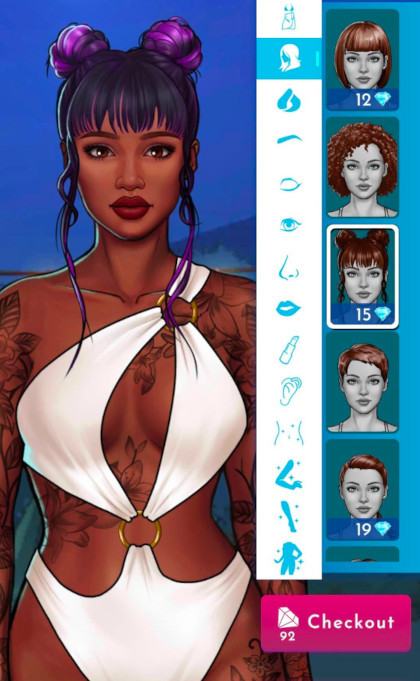
I know I say I'm done every season and then I get sucked in because my fandom friends beg me to play, but I really do think I might be done with this one. I'm just beyond uninterested. Their bait and switch "All-Stars" BS already set my teeth on edge, and I hate the "stars" they've brought back. I've seen the possible list of returning characters and there isn't a single one I care enough about to entice me to play. I love Marshall but if he comes back as a host, I don't care. It won't be canon to me. And if he comes back as a returning islander, I don't care because it won't be canon to me. There is such a fundamental disconnect in Fusebox's understanding of what people want. I'm just fucking tired. The seasons are coming so fast and furious that the fandom can't even get on its feet and enjoy what happened. I keep having to go back to the fandom wiki to even remember what happened in the previous seasons because they're just blurring together in my mind. There's no time to discuss it or theorize or come up with fun fanon. To make mood boards and character boards dedicated to what kind of house they'd live in. There's no time to craft a long fic for the season that just ended unless you start it at the beginning of the season before events even happen. It's just sucked out all the joy. Which maybe, might be the point? Throw them at us so fast, we play hard, and don't have time to think about it or criticize it or come up with ways to make it better. Consume it like a rice cake. Flavorless and forgettable. And I say this as someone who actually rather enjoyed last season, until it got stupid repetitive, with what felt like zero branching.
I dunno. I'm just not having fun. For those who are having a good time, or at least enjoying the chaos and train wreckage, I'm so glad. I look forward to hearing about it because I know I will 😆 For me, I'm gonna be focusing more on finishing TSIME and then working on some original fiction. And maybe some Romance Club fanfic, if the mood strikes me. Because the world building, branching, storytelling, and sexy love interests (even when I hate them) are delicious and immersive. NGL it's expensive, but RC is more generous with their gem rushes and tea parties and whatnot so I don't feel ripped off.
I mean look at this man. If I have to spend my hard earned money on something other than tea lattes from Starbucks, I'm spending it on him.


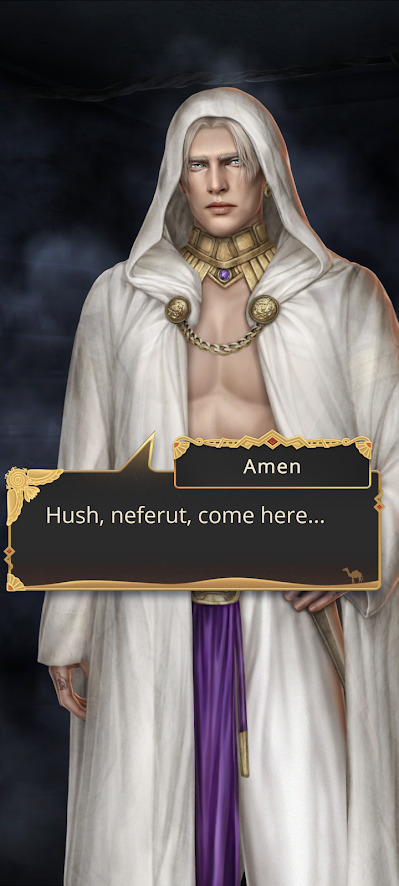
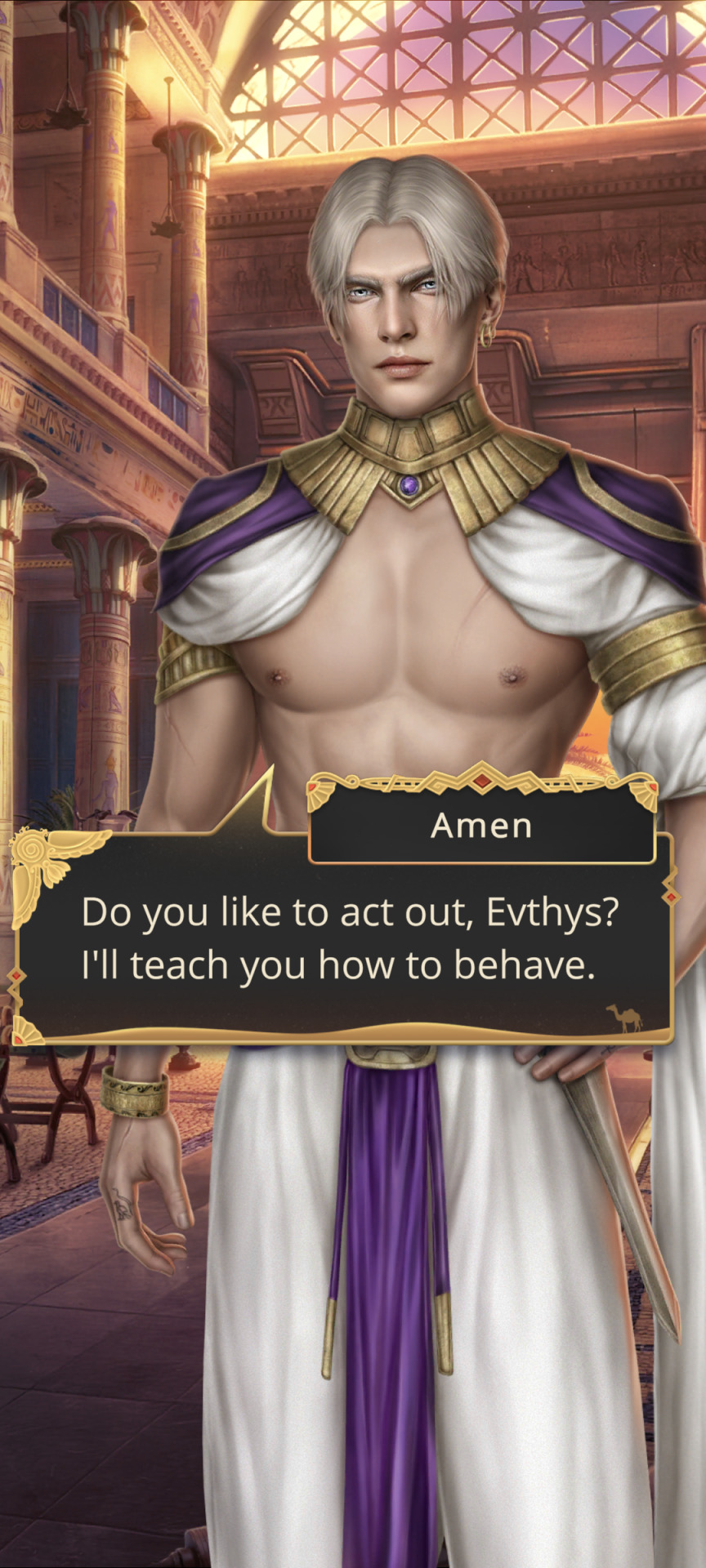

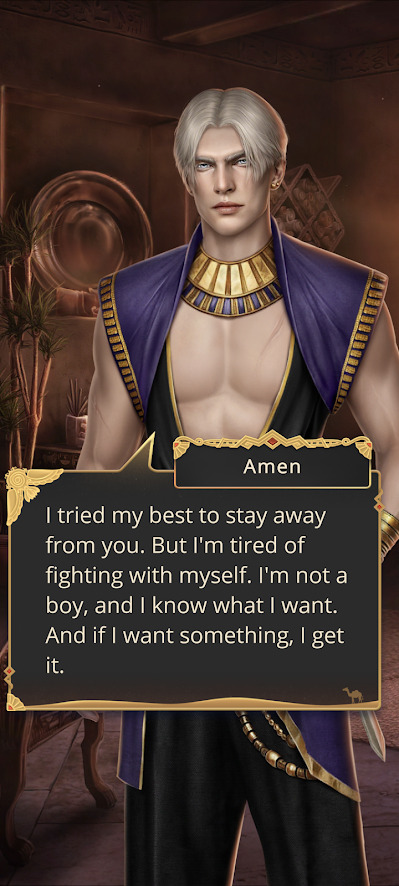

#not enough fomo in the world to make me graft Hamish#love island the game#litg all stars#litg s9#fusebooo#romance club#romance club amen#amen scn
18 notes
·
View notes